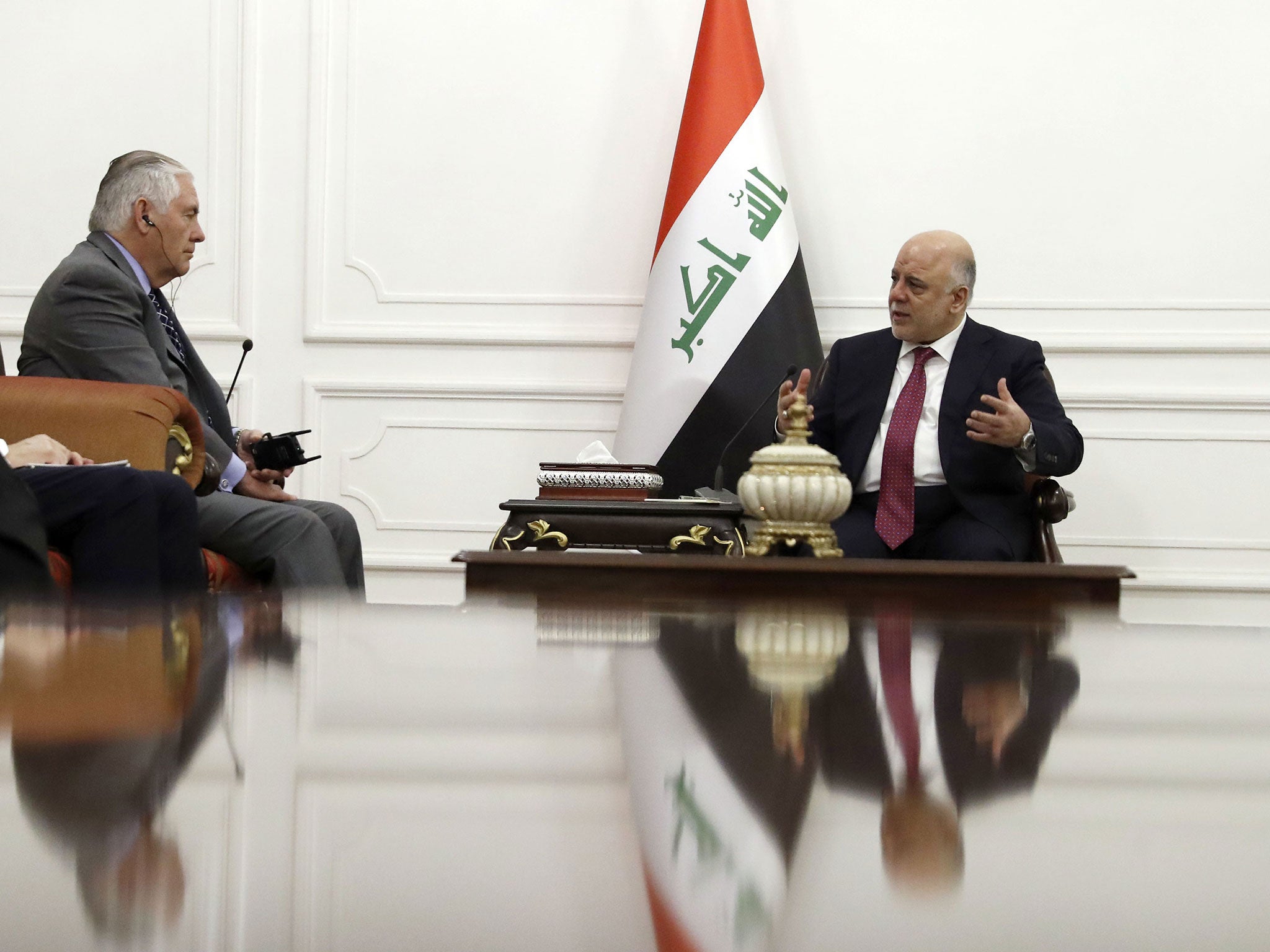US and Iran battle for influence in first post-Isis Iraq election
Analysis: Any Iraqi leader will seek to maintain good relations with both Washington and Tehran

Iraqi prime minister Haider al-Abadi is ahead in Iraq’s parliamentary election, according to unofficial results, in a poll that has added significance because of the escalating confrontation between the US and Iran.
The surprise of the election so far is the strong showing of the Shia populist nationalist cleric, Muqtada al-Sadr, who has an electoral alliance with the communists, and is said to be in second place, according to election officials speaking off the record. Full results are expected on Monday.
The voting on 12 May took place under tight security, but without Isis attacks causing mass casualties, a further sign that security in the country is better than at any time since 2003.
Turnout was low, at 45 per cent, the reduced number voting probably explained by a general disillusionment with political parties as corrupt, ineffective and, for the most part, with little to offer during an uninspiring election campaign.
Mr Abadi, who came to office after the Isis seizure of Mosul in 2014, is credited with the recapture of the city after a nine-month siege last year.
This success was closely followed by the Iraqi armed forces moving back into Kirkuk, which had been under the effective control of the Kurds since 2003.
But Mr Abadi leads only one of four or five parties and factions vying for power and none of which will achieve a majority in the new parliament.
Going by past experience, a government will be formed only after prolonged bargaining over senior positions. Although Mr Abadi will be credited by many for his successes against Isis and the Kurds, the improved security has made Iraqis even more conscious of the lack of reconstruction 15 years after the fall of Saddam Hussein.
The provision of water, electricity, housing and transport infrastructure remains very poor, despite the waste or theft of tens of billions of dollars in oil revenues.
The growing importance of social and economic issues helps explain the reported good showing of the followers of Mr Sadr, who come primarily from the Shia poor of Baghdad and southern Iraq.
His alliance with the secular communists, once a powerful political force in Iraq, emphasised his social radicalism as opposed to Shia sectarian allegiance at a time when many Iraqis feel that their religious parties have discredited themselves.
The Sadrists have a core of zealous followers and are well organised and professional in electioneering, suggesting that they may have benefited from a low turnout.
Mr Sadr led the Shia resistance to the US occupation in 2004 in which he was twice besieged in Najaf. He is aided by the high prestige of his family, his father Mohammed Sadiq al-Sadr and two of his brothers being assassinated on orders from Saddam Hussein in 1999.
He has, at different times, expressed hostility towards both US and Iranian interference in Iraqi politics, blaming them for fuelling violence and political divisions within the country.
The US and Iran will inevitably play a role in the formation of a new Iraqi government, with Turkey and Saudi Arabia playing a subsidiary role.
Since the First Gulf War of 1991, the US and Iran have been rivals for influence in Iraq, but they have also had some strong interests in common such as opposition to Saddam Hussein and, after his fall, opposition to al-Qaeda and Isis.
Mr Abadi and his predecessor as prime minister, Nouri al-Maliki, were only appointed after it was clear they were acceptable to both Washington and Tehran. President Donald Trump’s fierce attacks on Iran and his imposition of sanctions following his withdrawal from the Iran nuclear deal will make such covert cooperation more difficult.
Iraqi leaders tr maintain good relations with Iran and the US and this complicates the formation of a coalition government acceptable to both.
The US will want to limit the influence of Mr Maliki and Hadi al-Amiri, the leader of the paramilitary political grouping, as too close to Iran.
Iran, for its part, will seek to retain and expand its influence. The Kurds are much weakened by their political fragmentation, shortage of money and loss of Kirkuk, but they will still play an important role in forming a new government.
Subscribe to Independent Premium to bookmark this article
Want to bookmark your favourite articles and stories to read or reference later? Start your Independent Premium subscription today.

Join our commenting forum
Join thought-provoking conversations, follow other Independent readers and see their replies